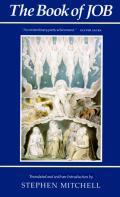Wednesday, September 14, 2005
Job on Katrina and Nature
The great destruction and loss of life brought by Hurricane Katrina has reminded several commentators of the Book of Job from the Hebrew Bible. In the face of natural disasters, we are forced to recall the problem of theodicy, of unfair suffering, of undeserved punishment. How can we reconcile the presence of evil and divine omnipotence, benevolence and justice?
The story of Job, of course, is about a good guy who suffers, argues for his innocence, cries out to God for an explanation, receives an answer of sorts, and in the end is restored. Most people are quick to interpret this, rather too simply, as a "testing" of Job's "faith," as proof that God will ultimately reward those who suffer, as long as they remain faithful. In this way, the innocent suffering brought by natural disasters can be understood as meaningful.
 Beyond this simple theodicy however, the book of Job offers a deeper environmental message. It comes from the divine answer Job receives:
Beyond this simple theodicy however, the book of Job offers a deeper environmental message. It comes from the divine answer Job receives:
Where were you when I planned the earth? Tell me, if you are so wise.
Do you know who took its dimensions, measuring its length with a cord?
What were its pillars built on? Who laid down its cornerstone, while the morning stars burst out singing and the angels shouted for joy!
Were you there when I stopped the waters,
as they issued gushing from the womb? When I wrapped the ocean in clouds and swaddled the sea in shadows? When I closed it in with barriers and set its
boundaries, saying, 'Here you may come, but no farther; here shall your proud waves break.'
"The Unnamable from within the Whirlwind," as Stephen Mitchell translates it, continues like this, providing a "God's-eye view of creation" and ultimately reminding Job that he is "dust." Job realizes that all worldly gains and losses, all human accomplishments and creations, are quite small when seen from the perspective of divine order.
The Book of Job suggests that when we humans begin to take over and control aspects of the cosmic order, to set our own boundaries for the waters, to alter the natural world to our liking, we in effect end up building "small things." We end up with fragile, worldly, human constructions far removed from the primal energy that created and sustains the broader cosmos. As we increasingly gain power to manipulate environmental realities, to reorder them for human utility, we likewise increasingly risk forgetting that they are "dust," that they can at anytime be reduced to complete insignificance in the broadest sense.
I can't say why Hurricane Katrina struck New Orleans and had such horrible consequences, but the Book of Job tells us that, in some ways, we shouldn't be too surprised... and perhaps, it tells us, that these kinds of ecological/natural disasters will be even more prevalent as we continue to engineer our environment.
Comments:
<< Home
There is so much truth to this. No matter how you choose to relate to the Ultimate reality, those who choose to manipulate, control, and monopolize better heed the warnings of Micah (especially in chapter 2 and 5).
Humility is a needed trait these days, that is often overlooked.
-scr
Post a Comment
Humility is a needed trait these days, that is often overlooked.
-scr
<< Home


